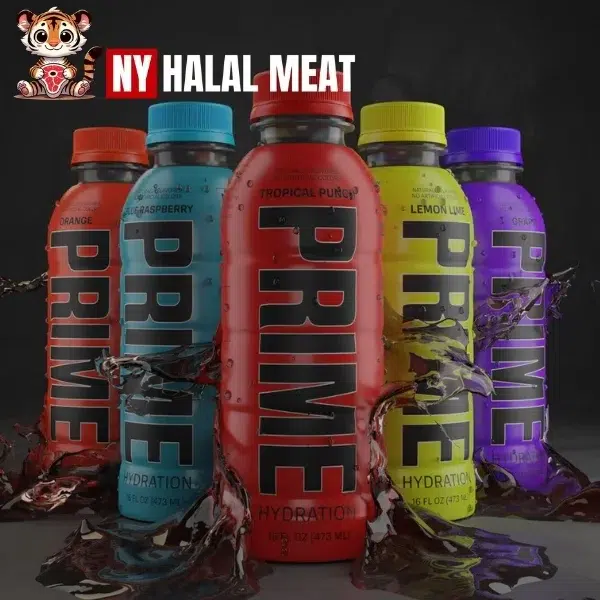Is Prime Drinks Halal? A Humanized and Detailed Guide for Muslim Consumers
The Growing Popularity of Prime Drinks Among Fitness Enthusiasts and Youth
Prime Drinks, founded by influencers Logan Paul and KSI, have taken the beverage market by storm. Their hydration and energy drinks are marketed as low-sugar, vitamin-rich, and packed with electrolytes. Designed for athletes, gym-goers, and health-conscious individuals, Prime Hydration and Prime Energy have also sparked curiosity among Muslim consumers questioning their halal status. For certified halal meats and options, visit NyHalalMeat.
Halal Beverage Requirements: What Makes a Drink Permissible in Islam?
For beverages to qualify as halal, they must be free of alcohol, harmful substances, and any ingredients sourced from non-halal animals. Additionally, the manufacturing process should avoid any contact with haram materials. Halal certification from recognized bodies offers Muslim consumers peace of mind that their drink meets these standards. Learn more about halal dietary standards at NyHalalMeat.
A Deep Dive into Prime Hydration and Prime Energy Ingredients
Prime Hydration boasts ingredients like coconut water, B vitamins, electrolytes, and flavoring agents. Prime Energy, designed for an extra boost, adds caffeine, taurine, and artificial sweeteners.
Ingredients Needing Closer Examination:
- Coconut Water: Naturally halal and plant-derived.
- B Vitamins (B6, B12): Typically synthetic or plant-based, but verifying the source is advisable.
- Electrolytes: Mineral-based, generally safe and halal.
- Taurine: Often synthetic today, but animal-derived taurine would not be halal.
- Artificial Sweeteners: Usually synthetic, yet processing methods vary.
- Natural/Artificial Flavors: Potential for alcohol-based extraction makes source verification necessary.
Taurine in Prime Energy: Is It a Concern for Halal Consumers?
Taurine is frequently questioned due to its potential animal origin. However, most energy drinks, including Prime, now use synthetic taurine, which is considered halal. Still, official confirmation from Prime would help Muslim consumers decide confidently.
Alcohol Content and Natural Flavors: Should You Be Concerned?
Prime Drinks list no alcohol among their ingredients. However, the vague term “natural flavors” can raise red flags since alcohol might be used in the extraction process. This uncertainty highlights the need for either direct clarification or halal certification.
Is There Any Halal Certification for Prime Drinks?
Currently, Prime Drinks do not carry any halal certification from leading authorities like JAKIM, IFANCA, or HFA. Without such certification, Muslim consumers are left relying on ingredient lists and unofficial company responses, which may not provide complete assurance.
Prime’s Official Position: What Does the Company Say About Being Halal?
Prime’s customer service reportedly claims that their products contain no alcohol or animal-derived ingredients. While this offers some reassurance, these statements do not replace official halal certification, which ensures rigorous checks and approval.
Scholars’ Perspective on Consuming Beverages Without Halal Certification
Islamic scholars often advise against consuming non-certified beverages where ingredient or process uncertainty exists. Although synthetic ingredients like vitamins and taurine may be halal, ambiguous items like natural flavors require caution without certification.
Flavors and Additives: A Key Factor in Determining Halal Status
Flavors—whether natural or artificial—can compromise halal status if alcohol-based solvents are used during extraction. This makes it essential for consumers to verify these components, particularly in drinks like Prime that lack certification. Explore certified halal options at NyHalalMeat.
Nutritional Benefits of Prime Drinks for Active Muslim Consumers
Prime Hydration is loaded with electrolytes and vitamins, making it appealing for hydration after workouts. Prime Energy adds caffeine and taurine, catering to those needing an energy boost. While these features support an active lifestyle, halal compliance remains crucial.
Prime Hydration vs. Prime Energy: Comparing Halal Suitability
- Prime Hydration: Generally appears halal-friendly based on known ingredients.
- Prime Energy: Contains caffeine and taurine, requiring further scrutiny.
Both lack halal certification, which can make strict halal consumers hesitant. For safer alternatives, visit NyHalalMeat.
Cross-Contamination Risks in Production: A Hidden Concern
Without halal certification, there is no guarantee that Prime’s production facilities prevent cross-contamination with non-halal substances. Certified facilities implement strict guidelines to eliminate this risk, reinforcing trust in the product.
Actionable Tips for Muslim Consumers Considering Prime Drinks
- Reach out to Prime for updated halal status information.
- Check packaging regularly for any halal certification updates.
- Opt for known halal-certified alternatives if uncertain, such as those from NyHalalMeat.
- Stay informed by consulting recognized halal authorities or websites.
Frequently Asked Questions (FAQs) About Prime Drinks and Halal Status

Q1: Is Prime Energy officially certified as halal?
A1: No, Prime Energy currently lacks halal certification.
Q2: Is the taurine used in Prime Energy synthetic and halal?
A2: It is likely synthetic and halal, but direct confirmation from the brand is advisable.
Q3: Does Prime contain any form of alcohol?
A3: Alcohol is not listed, but natural flavors could involve alcohol-based extraction.
Q4: Is Prime Hydration safer for Muslims to consume?
A4: Prime Hydration appears more halal-friendly, but without certification, caution is recommended.
Q5: How can Muslims verify the halal status of Prime Drinks?
A5: Consumers should directly contact Prime or wait for official halal certification. For guaranteed halal products, visit NyHalalMeat.


